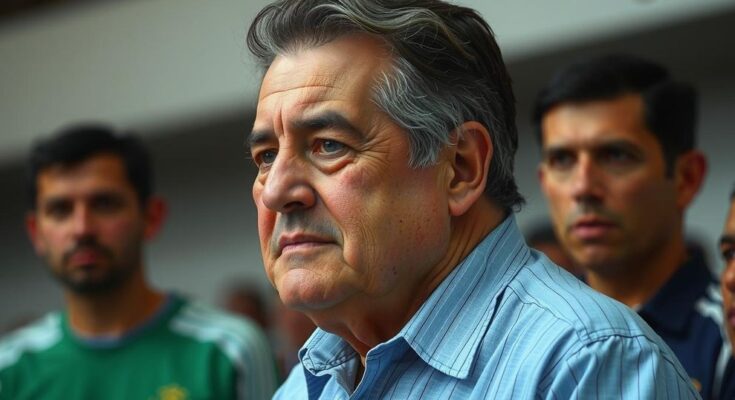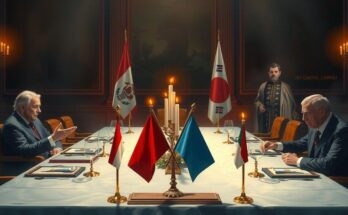Edmundo González Urrutia, the Venezuelan opposition leader, is on a regional tour to solidify international support for his presidency claim following disputed elections in July. His tour includes meetings with political leaders in Argentina and Uruguay, amidst tensions from Maduro’s regime. The political landscape remains complicated by regional attitudes and demonstrations in support of González within Venezuela, while international recognition before January 10 is critical for his legitimacy.
Edmundo González Urrutia, a key figure in the Venezuelan opposition, embarks on a regional tour, commencing in Argentina before proceeding to Uruguay. His aim is to garner international support for his claim to the Venezuelan presidency, following an assertion of electoral victory from July’s elections, as claimed by opposition sources. During his visit, he will meet with significant political leaders including President Javier Milei of Argentina and President Luis Lacalle Pou of Uruguay, who has publicly endorsed González’s position, citing evidence of his electoral majority.
The backdrop of this tour is fraught with political tension, especially as Nicolás Maduro’s regime remains resolute in its denial of the opposition’s claims and has even placed a bounty for González’s capture. Operating from exile in Spain, González must navigate the cautious attitudes of the international community, which is wary of repeating the earlier experience with Juan Guaidó in 2019, when unilateral recognition led to limited outcomes.
In addition, the Brazilian government under President Luiz Inácio Lula da Silva displays a nuanced stance toward the Venezuelan crisis, emphasizing mediation efforts without formally recognizing Maduro’s victory. Concurrently, civil unrest emerges in Venezuela, with plans for demonstrations supporting González on January 10, as opposition leader María Corina Machado urged citizens to rally in defiance of the regime. Human rights organizations have also raised alarms over the treatment of political prisoners, with some initiating hunger strikes to demand their freedom.
Maduro’s regime recently announced the release of more than 400 political prisoners, seemingly as a strategy to attract regional leaders to his inauguration. The legitimate status of any potential presidential office will ultimately hinge upon the events succeeding January 10, a pivotal date marking the end of Maduro’s current constitutional term.
The political landscape in Venezuela has been tumultuous, particularly since the contentious elections in July, which Edmundo González claims to have won, though these results are staunchly disputed by the current Maduro government. The unfolding situation reflects a significant divide in the country’s governance and international diplomacy. González’s pursuit of legitimacy is shadowed by past experiences where international recognition led to less than favorable outcomes for the opposition, inducing a more cautious approach globally. The role of neighboring nations, notably Brazil, also serves to illustrate differing regional attitudes in addressing this crisis, balancing between mediation and outright diplomatic recognition of the Maduro regime. Moreover, ongoing human rights concerns in Venezuela, highlighted by the situation of political prisoners, underscore the depth of the political crisis. The Venezuelan economy and civil stability are at critical junctures, making the forthcoming developments particularly consequential for both domestic and regional politics.
In conclusion, Edmundo González’s tour reflects significant political maneuvering ahead of a critical date in Venezuelan politics, attempting to establish a credible claim to leadership amidst considerable risks. The support he secures from regional nations will be instrumental in determining the future of both Venezuela and its relationships within South America. With the impending January 10 deadline for international recognition, the global community’s response will ultimately shape the trajectory of Venezuelan democracy and governance.
Original Source: en.mercopress.com




